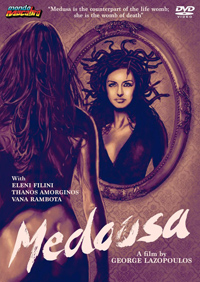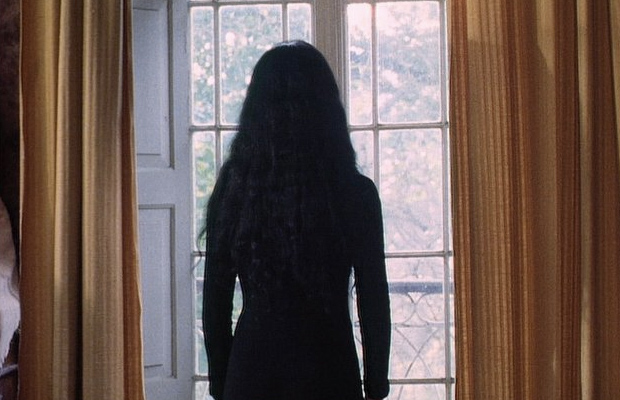
Young Percy grows up in a strange environment with his mother, who has guests over late at night while he harbors an unhealthy fascination with a magic show next door. An undefined tragedy seems to have visited their home from this period, but he grows into a young man (Thanos Amorginos) of Athens, running a biker bar and heading up a gang of miscellaneous miscreants. He’s introduced to a mysterious woman named Mrs. Meda by his friend and real estate agent Spiros (Eleni Felini), and they decide to break into her home once she’s moved in, discovering a bunch of eerie clothed statues of men in the house. Meanwhile, other strange statues have been appearing throughout the country, and eventually Percy, whose complete name is Perseus, learns he is destined to conquer the creature known as Medousa.
What’s most surprising about Medousa is to learn it was made in 1998 considering its score from Kostis Anagnostopoulos sounds like a late 80s genre medley. Director Lazopoulos, who hasn’t made any films since, attempts to convey an intimate re-telling of a famous fragment from Greek mythology and craft it into a homegrown urban legend. The problem is, despite developing a fitting ambience, perhaps owed to DP Vassilis Kapsouros (one of the only major crew members to have a notable filmography outside of this title), the narrative isn’t inventive enough to overlook the film’s dependence on low-fi special effects.
The repeated appearance of the bleached white statues clothed in whatever their victims were last wearing is initially amusing. But this was an effect used in Roger Corman’s 1959 cheapie A Bucket of Blood, where Dick Miller encases corpses in plaster for the sake of art. And a turning to sand effect similarly recalls Count Yorga, Vampire (1971). Like its villainous titular monster, masquerading under the pseudonym Mrs. Meds, the film is a creation unable to distance itself enough from its source material for viable reinvention. Instead, Lazpoulos simply achieves a similar effect as removing the vowels from Medusa’s name and delivers a dry, incomplete exercise merely suggesting the inability to eradicate past evils allowed to infect contemporary generations, where a culture obsessed with violence against women will eventually find the tables turned.
Film: ★★/☆☆☆☆☆
Disc: ★★★/☆☆☆☆☆
